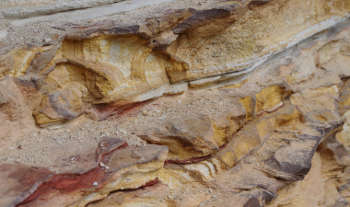Earth Sciences
Earth science covers a large range of disciplines, especially geology. Geologists and other specialist geoscientists study the Earth from both a physical and historical perspective. Physical geology examines materials (e.g., rocks) and processes that have come to build and shape the planet. The historical aspect of geology focuses on the origin and development of the planet through its 4.5-billion-year history. Students enrolled in various undergraduate courses (including non-scientific courses) can study earth science at UNE. This site will provide you with important information about the discipline at UNE, including undergraduate study and research.

Why Study Earth Science at UNE?
Our society is completely dependent on the responsible use of the Earth's mineral and energy resources and there is a growing need to understand and minimise the environmental impacts of their exploitation and use. Mineral and energy resources are some of Australia's largest export earners and will continue to be fundamental to the socio-economic well-being of the country in the future.
UNE has a long history of teaching and research in earth science and is conveniently located in the heart of the New England Fold Belt, providing an excellent natural laboratory for studying all aspects of the discipline. What makes studying earth science at UNE unique is that we offer our subjects in both internal and external modes, allowing students to study from home, no matter where you live in Australia, or indeed, the world! This is often ideal for students who work part-time or full-time. The external study mode is achieved through the world wide web as many of our subjects have their own personalised website, with access to all necessary subject materials, e.g., readings on eReserve. The websites also include discussion boards to promote interaction between students and academics, as well as a facility to submit assignments electronically. The practical components of our subjects, e.g., lab classes and lectures, are conducted during residential schools.
UNE is also an excellent academic environment for students to conduct research in earth science at various levels, e.g., Honours, Masters and PhD. Academic and Honorary staff members within Earth Sciences at UNE are highly qualified and respected researchers in their related fields. Research projects can be tailored to individual students. Students may wish to choose field sites that are local, interstate or overseas. UNE is also well equipped with modern research facilities (see 'Facilities' below).
Bachelor of Arts/Bachelor of Science Bachelor of Science with Honours Graduate Certificate in Environmental Science Doctor of Philosophy UNE and the University of Newcastle have joined forces to create a coherent program in earth science, with both institutions offering specialist units to allow for a well-rounded geoscientific education. UNE students co-enrolled in earth science units at the University of Newcastle will graduate with a strong degree in earth sciences and have a clear advantage over graduates from other institutions that do not provide a comprehensive coverage of the discipline. UNE offers the following earth science units: GEOL110 - Geology and the Environment I The University of Newcastle offers the following undergraduate earth science units (available to UNE students by cross-institutional enrolment): GEOS2170 - Optical Mineralogy and Igneous Petrology (Semester 1) Earth science graduates are in high demand and have excellent employment prospects. In recent years, Australia has suffered a shortage of geoscientists and their salaries on graduation are near the top of those for science, engineering and medical graduates. Graduates can expect to be employed in diverse locations within Australia, but there are also opportunities worldwide. Upon completion of your degree you can expect employment in: UNE is well equipped for teaching and research in earth science, with modern teaching laboratories (including a large teaching collection of minerals, rocks and fossils) and research facilities, including: For information on our research activities, please visit the pages of the Earth Science Research Group and the Palaeoscience Research Centre.Undergraduate
Bachelor of Environmental Science
Bachelor of GeoScience
Bachelor of Science
Bachelor of Science/Bachelor of Laws
Diploma in The SciencesBachelor Honours
Postgraduate Coursework
Graduate Certificate in Science
Graduate Diploma in Science
Master of Environmental Science and Management
Master of Scientific Studies Postgraduate Research
Master of Environmental Science (Research)
Master of Science
GEOL120 - Geology and the Environment II
GEOL202 - Introductory Palaeontology
GEOL206 - Field Mapping and Sedimentology
GEOL207 - Resource Geology and Environmental Issues
GEOL208 - Structural and Metamorphic Geology
GEOL209 - Introductory Optical Mineralogy
GEOL303 - Exploration and Environmental Geochemistry
GEOL305 - Ore Deposit Geology
GEOL311 - Palaeontology and Stratigraphy
GEOL312 - Geophysics and Applied GIS for Earth Sciences
GEOL313 - Environmental Geology
GEOL314 - Geological Field Mapping
ERS501 - Applied Research Skills in Environmental and Rural Sciences
SCI500 - Research Methods in the Sciences
GEOS3110 - Igneous Petrology and Crustal Evolution (Semester 2)
GEOS3160 - Geology of Fuels (Semester 1)
Contacts
For general and administrative enquiries, AskUNE.
Enquiries about studying earth science at UNE can be made to:
Dr Phil Bell
Phone: +61 2 6773 2329
Email: pbell@une.edu.au

